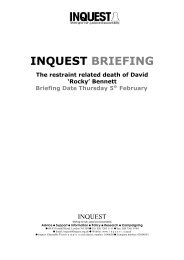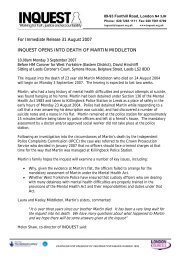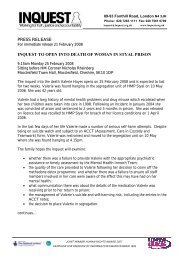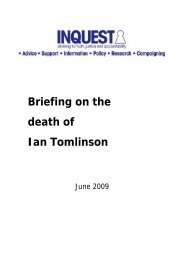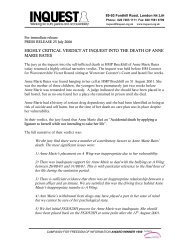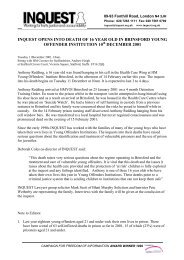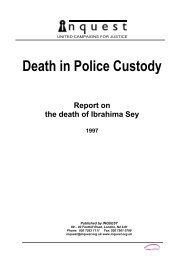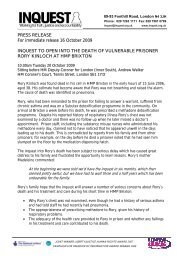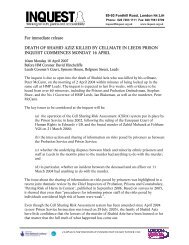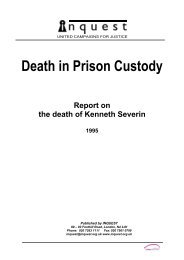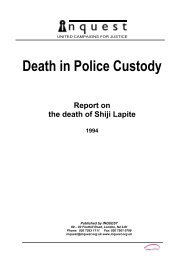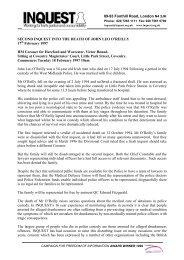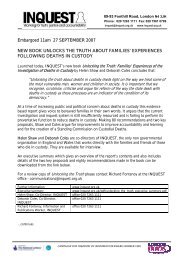Annual Report 2004 - Inquest
Annual Report 2004 - Inquest
Annual Report 2004 - Inquest
You also want an ePaper? Increase the reach of your titles
YUMPU automatically turns print PDFs into web optimized ePapers that Google loves.
9<br />
Suicide in Prison and have frequently briefed MPs for<br />
parliamentary debates and questions. We have also<br />
achieved high profile media coverage of the issue.<br />
Breakthrough in <strong>Inquest</strong> Law<br />
In March the ruling in the House of Lords in the cases of<br />
Middleton and Sacker relating to two self-inflicted deaths<br />
in prison was a major breakthrough for inquest law.<br />
INQUEST’s third party intervention was important in<br />
drawing the Lords’ attention to the context in which<br />
these deaths take place; the escalating number of selfinflicted<br />
deaths in custody; the fact that aside from<br />
hospitals there is no other area of State responsibility<br />
where so many people die from potentially preventable<br />
causes; and the shortcomings of the inquest system in<br />
delivering meaningful conclusions about the<br />
responsibility of State agencies in relation to those deaths.<br />
It has already resulted in a change in the way inquests are<br />
conducted, particularly in the way verdicts are formed.<br />
<strong>Inquest</strong> juries now have more opportunity to draw<br />
attention to any failings in the circumstances surrounding<br />
the death through the use of more narrative verdicts.<br />
This could result in a more meaningful conclusion to the<br />
inquest for families and all other parties.<br />
The significance of this judgment was seen at the<br />
conclusion of the inquest into the death of 16-year-old<br />
Joseph Scholes who died in Her Majesty’s Young Offenders<br />
Institute (HMYOI) Stoke Heath. The jury returned a<br />
verdict of “accidental death in part contributed because the<br />
risk was not properly recognised or appropriate<br />
precautions were not taken to prevent it”. In an<br />
unprecedented move the coroner recommended that a<br />
public inquiry be set up to examine in particular<br />
sentencing policy with regard to children as this was an<br />
area that was outside of the inquest’s remit.<br />
This was a meaningful conclusion to an inquest that<br />
heard very disturbing evidence about systemic failures to<br />
protect a vulnerable and damaged child while in the care<br />
and custody of the State. We ran a hard hitting and highly<br />
successful campaign with Nacro throughout the year to<br />
lobby government to set up the public inquiry.<br />
Investigation of Deaths in Prison and Police Custody<br />
Since 1 April, the Independent Police Complaints<br />
Commission (IPCC) and the Prisons and Probation<br />
Ombudsman (PPO) have taken over the investigation of<br />
deaths in custody. We have concerns about the<br />
independence of the PPO and their ability to appropriately<br />
communicate and consult with those representing bereaved<br />
families. This is particularly a matter of concern in relation<br />
to family liaison and the PPO has also refused to distribute<br />
our specialist leaflet What to do when someone you know



